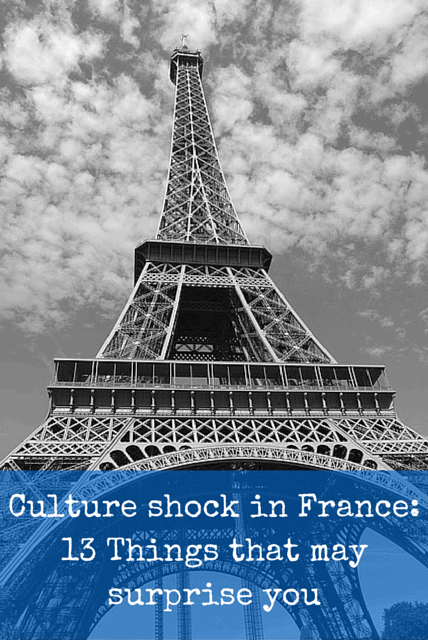The USA is a huge country, and no matter where you go, you’ll find all types of American convenience culture that includes things that make our lives easier and more efficient. In France, many things we take for granted in the USA are done a little differently. Let’s talk about them and how they contrast with American convenience culture.
Everyday USA convenience culture examples you won’t find in France

Photo credit: Shutterstock.com / Ryan DeBerardinis
OK, first up, here’s my quick disclaimer. France and the USA are different countries and that’s a great thing. It’s a lot of fun to learn about the things that make them unique. I’m not making a judgment call about what’s better where. I’ll leave that up to you. 😉
I’m just pointing out some differences you may want to be aware of before traveling. And let’s not forget the everyday conveniences France has to offer… like the ability to get fresh bread. Or being able to travel just about anywhere by train. The pros/cons balance themselves out in the end.

Photo credit: Shutterstock.com / NYCStock
1. Urgent care centers
I’m not talking about emergency room care at hospitals here. France absolutely has hospitals with emergency rooms and trauma centers for those of us who need that sort of care. What I’m talking about are the for-profit urgent care walk-in centers you find in many areas of the US that provide ambulatory care outside of traditional ERs.
They are commonly found in office complexes or as a storefront in strip malls. They are especially handy when you don’t have a local doctor or need care but don’t necessarily need to go to the ER at a hospital.
Urgent care centers treat a wide array of minor emergencies like breaks, burns, cuts, bad colds, nasty rashes, and whatever else you need a doctor for. They also provide pediatric care, have a full-service radiology department and much more.
Urgent care centers usually have extended business hours including holidays and weekends. Some larger cities in France may have a smaller urgent care clinic as part of their emergency services but it’s not exactly the same as what you’d find in the USA. If you need immediate care that goes beyond a doctor’s house call after hours in France, the ER is generally your only option.
2. Drive-through banks and pharmacies
I can’t say that there’s no bank or pharmacy in France that has a drive-through option, but I can say that they’re not common at all here. They certainly aren’t the norm culturally. If you need to go to the bank or pharmacy, you go inside and actually speak to a person about whatever you need.
Money and drugs are things you have to deal with in person! You can’t just roll up in your car and get your medicine or deposit checks at a drive through booth.
3. OTC medication available in the grocery store
Sometimes you just want to swing by the grocery store, pick up some Advil or other over-the-counter medicine, head to the self-checkout and be on your merry way. In France, medications of all kinds can only be found at the pharmacy — and they aren’t part of the grocery store.
Usually there’s an on-call pharmacy in every town (or nearby if you live in a small village) that’s open around the clock which is called la pharmacie de garde, but it’s not always convenient and sometimes it’s easier to not have to talk to anyone about what medicine you need and why.
Remember, in France, if you need anything from pain meds for a headache to an anti-diarrhea pill or anything, the pharmacy is the place you’ll need to go. But don’t worry. They’re often a lot of fun.

Photo credit: Shutterstock.com / Julia Kuznetsova
4. Free access to the restroom
At train stations, big department stores, and even on the street in bigger French cities, it often costs money to use the public toilet. The average fee I’ve paid lately is 50 centimes and it can be paid in cash or even with a card. I recently saw that option at the Bordeaux train station. Modern, eh?
Yes, the restrooms in train stations are usually well maintained so when there’s no other option, be prepared to pay up. Keep in mind that restaurants and stores generally won’t let you use their restroom unless you’re a customer.
Sometimes you’ll even find a code (that changes often) on your receipt to access the toilet in busier places like McDonald’s. Always keep a few coins in your pocket when out and about.
5. Free customer service numbers
French customer service is a little different than what I was used to, and one difference I noticed right away when I moved to France was the fact that phone numbers to call help lines were often not free.
Whether it’s the post office, your TV provider, an airline, or anything really, calls to speak to a customer service employee used to cost upwards of 15 centimes/minute. I find that interesting because you’re usually calling about a problem that’s not your fault, so to pay just to get the problem ironed out seems a bit over the top.
All of those centimes add up quickly especially when there’s a decent amount of hold time. The good part is these days, companies have made free numbers available in most cases and that’s most definitely a step in the right direction regarding customer service.

Photo credit: Shutterstock.com / QualityHD
6. Extended store hours
If you work a night shift in France and want to swing by the grocery store after work to do your shopping, you may have to wait a few hours. France doesn’t really have extended store hours at the grocery store, pharmacy, and big-box store like we do in the USA.
My local grocery store opens at 9 a.m. and closes at 7:30 p.m. Some of the bigger stores might close at 8 or even 9 p.m. in big towns. But a 24-hour grocery store (or something open until midnight) is pretty much unheard of in France, so plan accordingly.
Check out this post for differences between grocery stores in France vs. the US!
What do you have to add?
For more info on French culture topics, click over to this giant French culture roundup post! I also have an eBook to prepare you for your trip to France called “75 Beginner France travel tips for a standout trip!”
PIN IT:
Photo credit: Shutterstock.com / Ryan DeBerardinis (plus feature image)






Love your blog, been a long time reader but never commented.
When I lived in Europe, the paying-to-pee thing really got my bristles up. Most of the time those toilets were nasty. Still it was a great adventure.
Hi there, thanks for taking the time to comment :-). Yes the outdoor toilet can be a hit or miss but the paid ones inside train stations are usually pretty good!
I would add: no toilet seat covers and often no toilet seats, no porters in the train stations. Oh, and they don’t know how to make a martini. But I still love it there.
Now that paying to pee can cost .50 or even a euro I refuse. I find the closest cafe, order an espresso at the bar and go to the bathroom. This way instead of being annoyed I just enjoy the little treat of having a quick coffee when I need a bathroom break.
When I was in Montpellier and Toulouse (summer of 2016 and 2017, respectively, in case that matters), they had free public toilets everywhere. The ones in Montpellier were really well maintained, too….Toulouse not so much, lol. I was shocked because Madrid has next to no public toilet options apart from restaurants; the only exception is during Pride when they contract porta-potties to place in select areas throughout the center.
Getting packages delivered! No one — not La Poste, FedEx, UPS, Mondial Relay, GLS — will leave a package without putting it in your mailbox, handing it to you (or a reliable neighbor), or obtaining a signature. This makes the whole idea of paying for “delivery” ridiculous; you have to stay home all day (or at least for the “creneau” — which might be as long as 12 hours) to receive your delivery. If you can’t be there, then you have to go to a point de retrait to pick it up. That defeats the entire purpose of paying for delivery. There is simply no way of authorizing packages to be left without signature at your front door, as is the custom in America.
You have a great blog, always interesting topics. As I read them, I’m tucking little details away, you never know when they might come in handy. For this post, I would hate to need medical care when traveling in France, but things do happen. What would I do? At least now, I know not to look for an instacare facility. Thirsty at 22h00? The grocery store won’t be an option for a bottle of water. And for the restrooms, this was a lesson learned years ago, painful as it was. Nothing like begging for a few coins just to take care of business.
Thanks for your great posts, Diane! Please keep them coming!
Thanks so much, Eric, means a lot! 😉
Now to answer your question, you have a few options. First, there’s always the ER. You can go at any time of day or night and get your problem treated. But what’s trickier is when you have an issue that’s non-emergency but still bothering you after hours.
First line of attack is to make a phone call. There are on-call doctors who you can reach on the phone who can help you assess if you need to go to the ER, if you should have a doctor come to the house, or if you can wait it out until morning. Keep in mind that after-hours doesn’t always mean late at night but just outside of regular office hours (Sundays, any day before 8 or after 6pm more or less, etc.). It’s a free public service associated with the medical services in your area, if I remember correctly, so you aren’t calling your own doctor or a number that will charge you a fee. I had to call one Sunday when I was having an ocular migraine (but didn’t know what was happening at the time). They were great and advised me to go to the ER anyway.
Then there’s SOS Medecins, a network of doctors who do house calls at any time of day or night. Here’s the site for the group in my area, and as you can see, even during the night, the fees aren’t outrageous: http://www.sosmedecins-nantes.fr/
The issue with that is if you have something somewhat urgent that needs a radiology department or diagnostics, the doctor who comes to the house obviously can’t do imaging on the spot or anything more invasive, but they’re a good service to know about if you’re ever in need.
Also, remember that as a non-resident tourist, you have access to French medical care at the same rate French people do, except you won’t be reimbursed since you aren’t paying into the system. The retail rates, though, aren’t ridiculous so never be afraid of seeing a doctor or getting medication. A regular doctor’s visit is under US$30. The exception to that would be a catastrophic accident requiring hospitalization. While prices will be way less than the US, hospital bills still add up.
Anyway, hope that helped!
I became ill a few years ago in Paris and the hotel set up a doctors appointment for me. We took a cash with us (thinking it would be very costly as it is here in the US) and were surprised at only having to pay the equivalent of about $25. When getting my prescriptions filled they came to about $5 each, including forms that I could send to my insurance company. Everything was handled wonderfully.
The lack of access to restrooms never really bugged me until I had kids. So annoying.
Another convenient thing in the US is the free service for anything related to your cable or internet.
In France, it takes forever to get an appointment and they often charge you for it. The US generally has the best customer service.